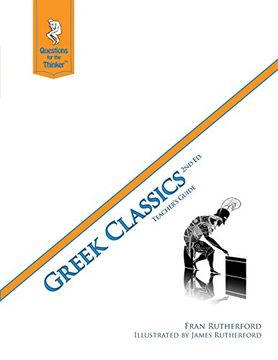Greek Classics 2nd Edition Teacher's Guide: Questions for the Thinker Study Guide Series (en Inglés)
Reseña del libro "Greek Classics 2nd Edition Teacher's Guide: Questions for the Thinker Study Guide Series (en Inglés)"
Fran Rutherford's two-volume Greek Classics (Student Book and Teacher's Guide - sold individually) provides an ideal course for parents who homeschool high school students and for teachers of secondary education who wish to introduce their students to the great books of Western civilization, "the best that has been thought and said," in Matthew Arnold's famous phrase. The choice of great books is appropriate, balanced, and coherent-each book illuminating an important facet of Greek thought and culture and embodying the moral wisdom of the Greek mind. The course covers Homer's Iliad and Odyssey, selections from the histories of Herodotus, Thucydides, and Xenophon, Aeschylus's trilogy The Oresteia, Sophocles' Oedipus trilogy of The Three Theban Plays, Aristophanes' The Clouds, and Plato's Republic-a rich banquet for the mind that integrates history, literature, and philosophy for a beginning humanities student. Comprised of brief but substantive introductions to the authors and to the works, the book then poses simple but penetrating questions about each chapter or major part of the book. It also presents probing questions for further reflection and discussion. For example, the questions at the end of a chapter test simple reading comprehension: "How does Odysseus convince Penelope that he is who he says he is?" "What proof of his identity does Odysseus give his father?" The questions for further thought are contemplative and thought-provoking: "What do you learn about Greek beliefs from Odysseus's visit to Hades"? and "How is our notion of hospitality different from that of the Greeks?" The Teacher's Guide of course offers the answers to the factual questions, but it provides special insights to address the questions for further though. How does the modern practice of hospitality differ from Greek customs? "Another difference is that the Greeks thought strangers were sent from the gods, so they had a religious duty to be hospitable. That idea was also expressed in the scriptures-notably in Hebrews 13:2: 'Do not neglect to show hospitality to strangers, for thereby some have entertained angels unawares'." The questions and answers are always lucid, straightforward and penetrating. The other features of the book that make it a valuable resource are the maps, illustrations, vocabulary, and explanation of technical terms. The maps of the Greek world and the Persian Empire, a diagram of the Greek theater in the round, the "words to know section" at the end of each chapter (e.g., "suppliant," "sycophant," "libation," "paean"), and the definition of Greek words like parados, agon, and deuterogonist all broaden the mind and provide breadth and depth to the course. In short, these two volumes provide a bone fide traditional, classical liberal arts education that introduces students to the reality of philosophical or universal truth, to the unchanging natural moral law that explains the nature of tragedy and the events of history, and to the Greeks' passionate love of knowledge and desire for glory. It transmits to students the patrimony of Greek civilization-the culture that discerned the difference between living and living well, between being "civilized" and being "barbaric". For students to know these perennial truths about human nature and the human condition is the beginning of wisdom-the goal of all true education.

